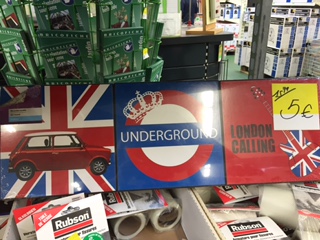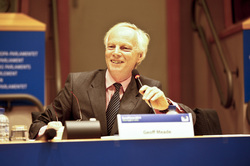|
I’ve been kicking myself lately for not putting 100 euros on Mr Johnson for PM all those years ago instead of just going on about it. I could have got very good odds. Anyway, no need to worry, as the latest twist in the referendum saga puts BJ out of the running. So my new prediction, hotly disputed by most who share my amazement that he’s given up without a fight after coming so close to the big prize, is that he will definitely be in the running next time – as long as next time is far enough away for the fury at his antics has subsided. Meanwhile, I’m apologising to my neighbours for being British. One of them took me a bit too seriously today, insisting with genuine warmth that there was always a place for the British in Belgium, after what we did for this country in time of war.
0 Comments
One of the least offensive things I’ve heard about Boris Johnson from Remainers is that he is living proof that you can fool 51.9% of the people all of the time. Today this former Brussels journalist and colleague looks set to go further and fulfil my 12-year old prediction that he would one day become prime minister.
I only half meant it back then, but he clearly did represent that point where celebrity and politics meet. One day, after seeing my old chum delighting a television chat show audience for the umpteenth time, I opined that his burgeoning political career would flourish on the back of support garnered almost entirely by stealth from those who knew him best as a figure of fun. Today Boris is on telly in front of a microphone announcing that “Project Fear”, allegedly run by the Remain campaign is over, and that everything is fine. I immediately felt more confident about everything, even though his remarks immediately followed a news bulletin announcing that the pound had hit a 31-year low. Now that’s what you call the Johnson magic. Amidst the usual traffic and security chaos which plagues the EU quarter of Brussels whenever Europe’s leaders come to town, a man in a smart suit is striding purposefully in the general direction of the summit venue, clutching his young son’s hand.
This man is an ardent federalist and forensic expert on all matters Union. This man’s bookshelves are lined with copies of the EU’s “Official Journal”, known as the “OJ”. This man has worked for decades to support the pillars of the European project. He is known in some quarters as “OJ Samson.” And now, reeling from the referendum result, this man is leading his son, the generation most affected by the folly of the Brexiteers, to join a protest rally being staged by members of the expatriate British community of Brussels, to express their outrage at the turn of events. But there is a problem. As usual at summit time, all main routes through the EU quarter are sealed off to traffic and people, except for those with summit badges. It makes life a nightmare for normal folk trying to go about their business. In fact, I’m amazed that the Bruxelloise haven’t risen up long ago against the “elites” whose EU shenanigans regularly disrupt their city. Luckily on this occasion I am on hand to warn this man that he is about to be rebuffed and turned back by police if he tries to continue on his path towards his demonstration somewhere on the edge of Parc Cinquantenaire. He will have to change course and walk along three sides of a square to arrive at his rendezvous, which is about 60 metres away in a straight line. This news is clearly the last straw. Pausing only to mutter very rude things about unelected, elitist interfering European policeman, he grabs his offspring and storms back home, vowing to protest against Brexit another day, when the fat cats of Europe in their bloody limousines have buggered off and left us in peace to carry on building a federal superstate. The man who popularised the phrase “information overload” has died, although presumably not from an overdose of Brexit bollockology. In 1970, in his best-selling book “Future Shock”, Alvin Toffler presciently forecast massive cultural, political and economic upheaval in the developed world because of the “roaring current of change” driven by mass communications and computers.
He was amazingly accurate, not least in warning that people and institutions that fail to keep pace with change face ruin. But his book was not immediately praised. Time magazine’s reviewer declared: “Toffler’s redundant delivery and overheated prose turned kernels of truth into puffed generalities.” Something, you could say all these years later, precisely sums up the fiasco of the Brexit debate. I was right about the factmongering: the local DIY store (Brico) has been panicked by Brexit into slashing the price of a three-pack of plastic wall-mounted pictures depicting glorious Blighty in all its Union-Jacked pomp. There are pix of a red Mini (the proper, original, pre-German bloated model; a London underground train station logo adorned with a royal crown, and a Union-jacked Brit-pop guitar alongside the words “London Calling”. Obviously anxious to offload this toxic stock before it becomes illegal to buy any UK tourist tat on the continent, the price has plummeted from 15 euros 99 cents to just five euros! All we need now is for the credit ratings agencies to downgrade this tat to “junk” status and Brico won’t be able to give it away.
This is exactly the kind of thing that Chancellor George Osborne warned would happen and the eurosceptics chose to ignore him. I was just nipping into my regular local restaurant today after another hectic round of post-Brexit hugs of commiseration from a bunch of NOOMS (Nationals Of Other Member States) when head waiter Simone, as cheery a dining host as you could wish for, intercepted me at the door and cheerily asked if he could possibly see my passport. Very witty.
There will be much more of this sort of thing in the days and weeks ahead and, just to prove the accuracy of this prediction, I was stopped in the street later by a Finnish photographer of my acquaintance who grinned and demanded to see my visa. These are the unintended consequences of Brexit that I was due to impart to listeners to BBC Radio Oxford, but when I put the headphones on in the studio there was, literally, radio silence due to a fire alarm. No matter, I made sure listeners to BBC Radio Manchester were made aware of my concerns that the alleged scaremongering by the Remain camp about the economic consequences of Brexit would turn out to be factmongering. Let the record showed that June 24, 2016, was “Hug a Brit” day at EU Commission headquarters here in Brussels.
Yes, the day that Brexit broke out, and while the referendum shock waves were still calculating how much of their pent-up fury to unleash, eurocrats of a continental bent spontaneously copied the unofficial and ultimately unsuccessful “Remain” campaign strategy which called upon citizens of other EU member states to shower Britons with love to convince them to vote to stay. We were waiting for jolly Jean-Claude Juncker – the man David Cameron tried to block from becoming Commission President. Oh folly! The previous night some of us had gathered at a local hostelry for a “Last Night of the Poms” social event to watch the results come in, fairly confident that the Poms were nowhere near running out of EU nights. Oh folly two! And now we British journalists were being hugged and squeezed by what Brexiteers call faceless eurocrats, who had clearing taken time off from interfering in every nook and cranny of my daily life to make us all feel better. Being very reserved types, we British of course showed little inclination to implement a reciprocal “Hug a Eurocrat” day, in case the gesture compromised our already shaky credentials for impartial engagement with “Brussels”. And Jolly Jean-Claude, normally a tactile sort, didn’t look ready to hug any Brits when he walked into the room. He looked like he’d like to slap a few round the chops though. He opened his remarks with a terse “Ladies and gentlemen and, in some cases, friends”…, So here it began, on Brexit Day One, with JJC delivering a no-nonsense statement agreed with three other EU presidents – Donald Tusk of the European Council, Martin Schulz of the European Parliament and Mark Rutte, holder of the rotating presidency of the Council of the EU. And yes, it does have to be this complicated, as befitting a family of 28, soon to be 27, Member States. Or maybe not so soon: early signs are that Downing Street – whoever that means in the months to come - is in no hurry to activate the “Article 50” EU departure plan which is the next step in the Brexit process of disentanglement. JJC has other ideas. He said he expected the UK government to give effect to the referendum Brexit decision as soon as possible “however painful that process may be”, adding: “Any delay will unnecessarily prolong uncertainty.” He announced that a “New Settlement for the United Kingdom Within the European Union” agreed last February – the Cameron reform package designed to win the referendum – “will now not take effect and ceases to exist. There will be no renegotiation”. And British eurocrats in the room, one or two of them genuinely tearful, visibly winced when Mr Juncker rubbed in the fact that any Brexit agreement “will be concluded with the UK as a third country”. Across the road, Minister for Europe David Lidington was making a tiny bit of history by being the first post-Brexit British government minister attending what should have been a routine gathering of EU ministers. But if Mr LIdington’s EU colleagues engaged in an impromptu “Hug a Brit Minister” policy, nobody was admitting it to the media. Back at Commission headquarters the Hug a Brit policy carried on, even after JJC swept out of the press room after abruptly denying a suggestion that Brexit might be the beginning of the end for the European Union. A “technical briefing” followed in a valiant attempt by eurocrats to tackle questions about exactly how, when, where and possibly why, the UK would be unshackled from the European Union. It was, as the name suggests, all very technical and as your correspondent departed, a female Spanish journalist rushed over and enthusiastically carried out her duty under the “Hug a Brit” policy, which involved a legally-binding squeeze round the middle accessorised with two big continental-style kisses on both cheeks. For the moment, it is still okay to be British in Brussels, but it may not last. |
AuthorGeoff Meade Archives
October 2021
Categories |
A Meade Davis Communications website || All rights reserved



 RSS Feed
RSS Feed